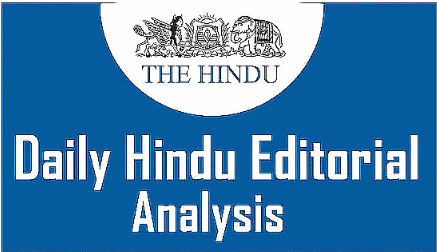The Hindu Editorial Analysis- 7th June 2025 | Current Affairs & Hindu Analysis: Daily, Weekly & Monthly - UPSC PDF Download

A Return to Indo-U.S. Trade Talks
Why in News?
India and the United States are resuming formal trade negotiations, with a focus on expanding strategic cooperation and resolving tariff-related disputes after years of deadlock.
Background
- Trade talks were suspended during the Trump era due to tariff disagreements.
- India had withdrawn GSP (Generalized System of Preferences) privileges and imposed retaliatory tariffs.
Current Developments
- U.S. and India agreed to terminate six WTO disputes in 2023.
- Positive momentum with renewed intent for bilateral trade pact discussions.
- Digital trade, IPR, and tariff reduction on specific goods are on the agenda.
Challenges
- Protectionist tendencies in both economies.
- Differences in digital trade rules, data localization, and e-commerce.
- India’s agriculture subsidies remain a concern for U.S. negotiators.
Way Forward
- Need for comprehensive framework beyond ad-hoc deals.
- Enhance cooperation under IPEF (Indo-Pacific Economic Framework).
- Use trade diplomacy to strengthen geopolitical alignment.
Practice Question: Discuss the evolving dynamics of Indo-U.S. trade relations. How can trade cooperation between the two democracies be leveraged to bolster their strategic partnership? (250 words|15 marks)
Climate Impact of Water Stress
Why in News?
With water scarcity intensifying due to extreme heat, India’s cities are witnessing water stress with poor infrastructure, leakage, and inter-state disputes.
Key Challenges
- Delhi faces water crisis as Yamuna levels dip.
- Climate change increases unpredictability of rainfall and river flows.
- Poor urban planning and over-extraction compound the issue.
Legal and Institutional Gaps
- No integrated water policy at national level.
- Fragmented roles between Central and State bodies.
- Poor enforcement of groundwater regulations.
Climate Vulnerability
- Urban poor worst hit by heat and water shortages.
- Increases health risks, migration, and social conflict.
Way Forward
- Invest in water recycling, rainwater harvesting.
- Strengthen inter-state coordination mechanisms.
- Declare water security as a core part of climate resilience planning.
Practice Question: Water stress in Indian cities is not just an infrastructural problem but a climate governance challenge. Examine. (250 words|15 marks)
The Missed Moment in Educational Equity
Why in News?
The editorial critiques India’s inability to leverage the NEP 2020 for bridging educational inequalities, particularly for underprivileged students.
NEP Goals vs Ground Reality
- NEP 2020 aimed at access, equity, and quality.
- Digital learning widened the gap during the pandemic.
- Dropout rates remain high in marginalized sections.
Systemic Barriers
- Poor internet access, lack of devices, and teacher shortage.
- High reliance on low-fee private schools with poor learning outcomes.
- Lack of targeted support for first-generation learners.
Recommendations
- Increase public investment in school infrastructure and digital tools.
- Provide remedial support and counseling in underperforming schools.
- Foster inclusive teacher training and pedagogy.
Practice Question: Critically assess the role of the National Education Policy 2020 in promoting educational equity in India. (250 words)
|
38 videos|5214 docs|1096 tests
|
FAQs on The Hindu Editorial Analysis- 7th June 2025 - Current Affairs & Hindu Analysis: Daily, Weekly & Monthly - UPSC
| 1. What is the relationship between water stress and climate change? |  |
| 2. How does water stress affect educational equity? |  |
| 3. What steps can be taken to mitigate the impacts of water stress on education? |  |
| 4. Why is it important to address water stress in discussions about climate policy? |  |
| 5. What role does community involvement play in managing water resources effectively? |  |
















